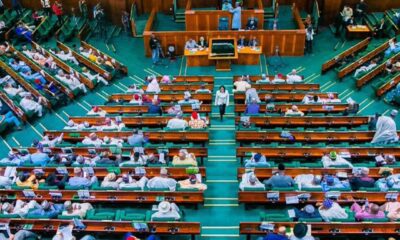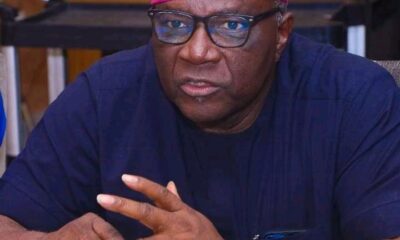Industry
MAN opposes increase in electricity tariff
By Oluwaseun Ogunsola
The Manufacturers Association of Nigeria (MAN) has condemned the proposed increase by 40 per cent in electricity tariff from July 1, 2023, describing it as outrageous, adding that the move could sound the death knell for many small and medium-sized enterprises (SMEs) in the country.
This was made known in a statement by MAN’s Director-General, Segun Ajayi-Kadir, who said that effective and fairly priced electricity supply has always been a challenge for manufacturers, forcing many of them to add unreliable electricity supply with alternative energy sources, such as diesel, which has unfortunately become increasingly expensive.
He warned that the government should avoid introducing measures that will further choke the manufacturing sector and the whole economy. Surveyed data by MAN showed that manufacturers spent at least N144.5 billion on sourcing alternative energy in 2022, up from N77.22 billion in 2021. This translates to about 87 per cent increase in the cost of access to alternative energy sources by manufacturers within a year.
“In the last eight years, electricity tariff has been increased by 186 per cent. The fact that the government itself owes N75 billion in unpaid electricity bills is indicative of how burdensome the cost of electricity has become. A 40 per cent hike at this time is simply outrageous.”
He added that a further rise in electricity tariff would increase the cost of production for manufacturers. “Already, we have power constituting between 28-40 per cent in the cost structure of manufacturing industries. You can imagine the impact on manufacturing industries that are energy-intensive such as metal processing, heavy machinery and chemical manufacturing.”
Ajayi also added that an increased in the electricity tariff would wear away profit margins and reduce their ability to expand operations and create new jobs as well as disrupt activities for SMEs who are unable to accommodate the higher price.
“The hike would also reduce the manufacturers’ profitability and by extension the quantum of taxes and fees payable to the three tiers of government. Manufacturers remain the largest income taxpayer in the country. Therefore, in the event of poor income generation due to high costs of production, the government purse will suffer.
He added that additional costs would be passed to final consumers, complicating inflation. “The increase will further reduce purchasing capability and one of the resulting effects is the fall in demand and recession of manufacturing activities over time. The high cost of the products will make locally produced items less competitive when compared with imported alternatives.
“This is also true of exports, as Nigeria products may find it more difficult to penetrate foreign markets. Such a move will restrict our export earnings because it will be impossible to compete with counterparts in global trading. Some manufacturing industries may consider shifting production to other economies with lower electricity tariffs and guaranteed availability.”
He said they had hoped that the Federal Government and NERC would ensure improvement in electricity generation, transmission and distribution that will lead to adequate and reliable electricity supply in the country, rather than increasing the tariff on the mere 4000MW to meet all revenue needs of stakeholders in the electricity supply industry.
“Government should ensure that at least 90 per cent of electricity consumers are metered to ensure consumption reflective electricity bill payment, formulate electricity policies that will aid investment in energy industry to increase generation capacities that will usher in large scale production of electricity and ensure effective implementation of the recent Electricity Act (2023) that is aimed at increasing electricity supply in the country.”
He pointed out that there is urgent need for the diversification of energy sources and intensifying infrastructure investment in the power sector; eradicating outrageous bills by closing the metering gap through the liberalisation of ultimate users’ access to effective mass metering; ensuring the connection of all consumers to the grid to avoid free-riding and unfair charges on the few connected consumers; increasing electricity supply base in order to distribute the total cost among a high number of consumers at a much lower unit cost and eradicating energy poverty.
“Our expectation is that the government will engage in extensive and intensive consultations with manufacturers; focus on measures that will salvage the sector and halt the trend of shutdown of factories, knowing the implications and the multiplier effects on employment and the economy. Care should be taken to avoid introducing burdensome measures that will further strangulate the manufacturing sector and the whole economy.”
Industry
Golden Terra Oil campaign rekindles memories of love and tradition



In the bustling kitchens of homes across Nigeria, something magical is happening. Amidst the sizzle of pans and the aroma of spices, families are coming together in a celebration of love, nourishment, and togetherness. Golden Terra Soya Oil’s “Pour Pure Love” campaign has captured the hearts and taste buds of consumers nationwide.
For AlhassanSule, an engineer, watching the ad repeatedly reminds him of a time long gone, yet still etched vividly in his memory. As he watches the scene unfold on screen—a mother stirring a pot of soup, the aroma filling the kitchen—he can’t help but be transported back to his own childhood home.
Suddenly, he was a young boy again, sitting at the kitchen table, watching his mother cook with the same love and care. He could almost taste the flavors of her cooking, and feel the warmth of her embrace as she served him a bowl of steaming hot soup.
But it wasn’t just the sights and smells that brought tears to his eyes; it was the flood of emotions that accompanied them—the love, the warmth, the sense of belonging. In that moment, he realised how much those simple meals had meant to him, how they had formed the foundation of his most treasured memories.
As the ad came to an end, he finds himself smiling through his tears, grateful for the reminder of the love that had always been there, even in the simplest of moments. And as he reached for a bottle of Golden Terra Oil at the supermarket, he did so not just as a consumer, but as someone who had been touched by the power of nostalgia and the enduring bond of family.
The “Pour Pure Love” campaign emphasises the importance of creating an emotional connection with consumers by offering meaningful connections in addition to high-quality products.
Chief Marketing Officer, TGI Group, Probal Bhattacharya stated that the outpouring of positive reviews and engagement from consumers for the “Pour Pure Love” campaign underscores the enduring connection between Golden Terra Soya Oil and the moments of motherly love and care shared around the dining table.
“Our goal is to be more than just a product on the shelf – we strive to be a trusted companion, a source of inspiration, and a symbol of warmth and love. With the Pour Pure Love campaign, Golden Terra Oil pays tribute to all the world’s Moms for the warm tasty meals that fill our hearts and our souls with all the love that they pour selflessly into our lives,” he stated.
Golden Terra Soya Oil is a premium, all-purpose cooking oil made from 100 percent pure soya beans, sourced and manufactured in Nigeria. It contains 5x more PUFA (Polyunsaturated Fatty Acids) proven to deliver numerous health benefits, like reducing cholesterol, maintaining a healthier heart, enhancing nerve function, boosting brain health, and supporting muscle strength. Discerning consumers trust Golden Terra Soya Oil to bring an unmatched balance of Taste & Health to every dish cooked with it. Available in various sizes, including 1000ml pouch, 700ml and 1.4L bottles, and 2.5L, 4.5L, and 25L kegs.
Tropical General Investments (TGI) Group is an international investment and holding company with diversified interests and investments across Africa, The Middle East, Asia, and other emerging markets. TGI’s investments focus on driving inclusivity and value addition using locally sourced raw materials, state-of-the-art manufacturing facilities, and a highly skilled workforce to produce world-class products that are consumed both locally and exported to global markets. Across markets, TGI Group owns over a hundred leading brands in Fast Moving Consumer Goods, Agricultural Inputs, Industrial Chemicals, Homecare Products and Pharmaceuticals.
Industry
Golden Terra Oil campaign rekindles memories of love and tradition



In the bustling kitchens of homes across Nigeria, something magical is happening. Amidst the sizzle of pans and the aroma of spices, families are coming together in a celebration of love, nourishment, and togetherness. Golden Terra Soya Oil’s “Pour Pure Love” campaign has captured the hearts and taste buds of consumers nationwide.
For AlhassanSule, an engineer, watching the ad repeatedly reminds him of a time long gone, yet still etched vividly in his memory. As he watches the scene unfold on screen—a mother stirring a pot of soup, the aroma filling the kitchen—he can’t help but be transported back to his own childhood home.
Suddenly, he was a young boy again, sitting at the kitchen table, watching his mother cook with the same love and care. He could almost taste the flavors of her cooking, and feel the warmth of her embrace as she served him a bowl of steaming hot soup.
But it wasn’t just the sights and smells that brought tears to his eyes; it was the flood of emotions that accompanied them—the love, the warmth, the sense of belonging. In that moment, he realised how much those simple meals had meant to him, how they had formed the foundation of his most treasured memories.
As the ad came to an end, he finds himself smiling through his tears, grateful for the reminder of the love that had always been there, even in the simplest of moments. And as he reached for a bottle of Golden Terra Oil at the supermarket, he did so not just as a consumer, but as someone who had been touched by the power of nostalgia and the enduring bond of family.
The “Pour Pure Love” campaign emphasises the importance of creating an emotional connection with consumers by offering meaningful connections in addition to high-quality products.
Chief Marketing Officer, TGI Group, Probal Bhattacharya stated that the outpouring of positive reviews and engagement from consumers for the “Pour Pure Love” campaign underscores the enduring connection between Golden Terra Soya Oil and the moments of motherly love and care shared around the dining table.
“Our goal is to be more than just a product on the shelf – we strive to be a trusted companion, a source of inspiration, and a symbol of warmth and love. With the Pour Pure Love campaign, Golden Terra Oil pays tribute to all the world’s Moms for the warm tasty meals that fill our hearts and our souls with all the love that they pour selflessly into our lives,” he stated.
Golden Terra Soya Oil is a premium, all-purpose cooking oil made from 100 percent pure soya beans, sourced and manufactured in Nigeria. It contains 5x more PUFA (Polyunsaturated Fatty Acids) proven to deliver numerous health benefits, like reducing cholesterol, maintaining a healthier heart, enhancing nerve function, boosting brain health, and supporting muscle strength. Discerning consumers trust Golden Terra Soya Oil to bring an unmatched balance of Taste & Health to every dish cooked with it. Available in various sizes, including 1000ml pouch, 700ml and 1.4L bottles, and 2.5L, 4.5L, and 25L kegs.
Tropical General Investments (TGI) Group is an international investment and holding company with diversified interests and investments across Africa, The Middle East, Asia, and other emerging markets. TGI’s investments focus on driving inclusivity and value addition using locally sourced raw materials, state-of-the-art manufacturing facilities, and a highly skilled workforce to produce world-class products that are consumed both locally and exported to global markets. Across markets, TGI Group owns over a hundred leading brands in Fast Moving Consumer Goods, Agricultural Inputs, Industrial Chemicals, Homecare Products and Pharmaceuticals.
Industry
Terra Seasoning Cubes redefines value with Saver and Super Packs


When it comes to seasoning, Terra Cubes has become one of the most popular household names in the Nigerian market. Its blend of carefully sourced natural ingredients which delivers consistent taste, rich mouth-watering flavor, and inviting aroma sets it apart from other seasoning cubes. Now, as part of its commitment to providing the best quality of Seasoning cube at an affordable price and convenient size, Terra Cubes has launched Saver and Super Saver pack.
Introducing the Saver and Super Saver packs, where quality, taste, and affordability converge to redefine your shopping experience. The new packs deliver the same premium quality and delightful taste you expect in a more convenient and cost-effective package.
With the Saver and Super Saver packs, gone are the days of frequent market visits to settle for small, individual packets. Instead, embrace the freedom, affordability, and convenience of purchasing required quantities at once.
Whether you are a homemaker stocking up for a family gathering, preparing for the week ahead, or simply looking to make smarter cost choices without sacrificing the great taste, mouth-watering flavour, and inviting aroma, that Terra Cubes is renowned for, the Saver and Super Saver packs are your ultimate companion.
The Saver pack is available in Chicken and Beef variants, containing 50cubes in a pack, while Super Saver pack is available in Chicken variant, containing 100cubes in a pack.
Group Executive Director – TGI, Deepanjan Roy, says the success of the Saver and Super Saver pack sizes is a result of the company’s resolve to put the interests of consumers first by seeking ways to continually excite and add value to their lives.
“We believe in going above and beyond to understand the needs and preferences of our consumers and the Saver and Super Saver packs are a testament to this commitment. These packs offer not only unparalleled convenience and value along with the assurance of premium quality and delightful taste,” he stated.
Chief Marketing Officer, TGI Group, Probal Bhattacharya expressed delight with the brand’s latest innovation; the Saver and Super Saver packs. With these packaging options, Terra Cubes is setting a new standard in value within the seasoning market.
“The Super Saver & Saver packs were born out of our understanding of our consumers, their need for a more convenient pack with the adequate quantity that seamlessly fits into their consumption and planned purchase behavior. These new offerings have been designed for consumers who want the right quantity of their favorite seasoning cube, Terra, in a pack size that balances convenience with superior value for money,” he said.
As Terra Seasoning expands its footprint in the market, the availability of the Saver and Super Saver packs underscores the brand’s dedication to catering to the varied requirements of customers while maintaining affordability.
Terra Seasoning Cubes are made up of wholesome, carefully sourced essential ingredients specially designed to meet the discerning Nigerian consumers’ needs in every meal, offering great taste, flavour, and aroma for that unique cuisne experience. Every meal cookedwith Terra guarantees an enjoyable meal and a rich signature homemade taste experience.Available in Beef, Chicken, Srimp, and Jollof flavours, in various consumer-friendly pack sizes nationwide.
Tropical Genral Investments (TGI) Group isan international investment and holding company with diversified interests and investments acoss Africa, The Middle East, sia, and other emerging mrkets. TGI’s investments focus on driving inclusivity and value addition using locally sourced ra materials, state-of-the-art manuacturing facilities, and a highly sklled workforce to produce world-cass products that are consumed both locally and exported to global markets. Across markets, TGI roup owns over a hundred leadin brands in Fast Moving Cosumer Goods, Agricultural Inputs, Industrial Chemicals, Homecare Products and Pharmaceuticals.
-
capital market2 years ago
Rt.briscoe, FBNH, Others halts negative performance of stock market
-
Finance3 months ago
Court orders Sen. Victor Umeh to repay N136m bank debt to AMCON
-



 Abuja Update2 months ago
Abuja Update2 months agoUNDP, FG partnership needed to achieve inclusion, equity- Minister
-
Abuja Update1 month ago
Banks drive stock market performance with N147bn gain
-



 Business1 week ago
Business1 week agoTingo Group unveils Tingo Electric, Tingo Cola drink at Lagos launch
-



 Health2 weeks ago
Health2 weeks agoCapacity training will reduce migration of health workers- NPHCDA
-
News4 months ago
Oil thieves sponsoring malicious media campaign against Navy – Spokesman
-



 Infotech1 month ago
Infotech1 month agoWorld Backup Day: NITDA urges Nigerians to ensure backup of data












